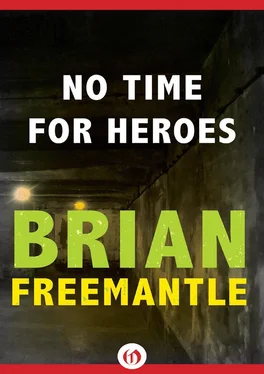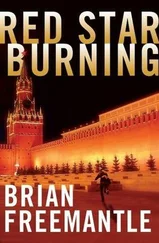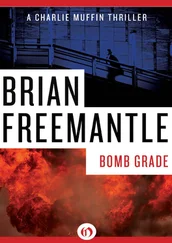Brian Freemantle - No Time for Heroes
Здесь есть возможность читать онлайн «Brian Freemantle - No Time for Heroes» весь текст электронной книги совершенно бесплатно (целиком полную версию без сокращений). В некоторых случаях можно слушать аудио, скачать через торрент в формате fb2 и присутствует краткое содержание. Жанр: Триллер, на английском языке. Описание произведения, (предисловие) а так же отзывы посетителей доступны на портале библиотеки ЛибКат.
- Название:No Time for Heroes
- Автор:
- Жанр:
- Год:неизвестен
- ISBN:нет данных
- Рейтинг книги:5 / 5. Голосов: 1
-
Избранное:Добавить в избранное
- Отзывы:
-
Ваша оценка:
- 100
- 1
- 2
- 3
- 4
- 5
No Time for Heroes: краткое содержание, описание и аннотация
Предлагаем к чтению аннотацию, описание, краткое содержание или предисловие (зависит от того, что написал сам автор книги «No Time for Heroes»). Если вы не нашли необходимую информацию о книге — напишите в комментариях, мы постараемся отыскать её.
No Time for Heroes — читать онлайн бесплатно полную книгу (весь текст) целиком
Ниже представлен текст книги, разбитый по страницам. Система сохранения места последней прочитанной страницы, позволяет с удобством читать онлайн бесплатно книгу «No Time for Heroes», без необходимости каждый раз заново искать на чём Вы остановились. Поставьте закладку, и сможете в любой момент перейти на страницу, на которой закончили чтение.
Интервал:
Закладка:
Inside the embassy, Firsov left Danilov with as much dismissiveness as he could achieve, and the reminder that the ambassador expected to see all communications to Moscow. Pavlenko led the way to the cultural section, Redin following. It was the security man who unlocked the door with an almost theatrical flourish, standing back for Danilov to enter. From the threshold Danilov saw a desk in immaculate order, pens and pencils in their holders, document trays bare, telephones neatly in line, and a pristinely white and unmarked blotter. A wastepaper basket alongside was empty.
Hopeless, he thought: they’d had the last, mocking laugh.
Momentarily Olga frowned into the telephone, not recognising the voice. Then she said: ‘Yevgennie! How are you?’
‘Didn’t want you to become lonely without Dimitri,’ said the man. ‘Would you like to eat out one night?’
‘Tell Larissa to call me, so I’ll know what she’s going to wear,’ asked the woman.
‘We’ll have to see how her shifts work out. She might not be able to make it. But that would be all right, wouldn’t it?’
Olga, who didn’t want to spend time by herself at Kirovskaya, hesitated. ‘I suppose so.’
‘I’ll telephone, in a day or two. Set something up.’
‘I hope Larissa can make it.’
‘You can trust me by myself.’
Kosov made another call immediately after disconnecting from Olga. ‘It’s all arranged,’ he said.
‘Good,’ replied Arkadi Gusovsky, in the study of his Kutbysevskiy mansion. He turned to Yerin as he replaced the receiver. ‘He’s done what we told him to do.’
The blind man appeared surprised. ‘Everyone does what we tell them to do. They have to.’
CHAPTER SEVENTEEN
Danilov was aware of the two men following as he entered the room. He turned, stopping them before they were fully inside. Remaining in their path, Danilov said: ‘Thank you.’
‘There may be something that needs explaining,’ said Pavlenko.
‘If there is, I’ll ask,’ said Danilov.
‘I am the senior security officer,’ said Redin. ‘I will assist you.’
‘I don’t need help,’ refused Danilov. He couldn’t have staged such an open confrontation in the old omnipotent days of the KGB. He wasn’t sure he could do it now. But Redin flushed, as he had in the car, twitching a look towards the cultural attache, and Danilov knew he had won. ‘Thank you,’ he repeated, closing the door upon them as they retreated into the outer office.
Danilov turned, his back to the door, looking once more into what, under closer examination, scarcely qualified as an office at all. It was a cubicle created by hardboard screening from a corner of the huge, open room beyond, and so small it would have been almost absurdly overcrowded with three in it, particularly if one were carrying out any sort of search. So why had they tried to pack in behind him? Was it simply for a diplomat and a security officer to watch him, the intrusive outsider, at all times? Serov’s workplace had obviously been searched. Had they wanted to watch him do it again because they’d found nothing and were anxious to see if he would do better? Redin was a professional intelligence officer, whose training included the craft of room scrutiny.
At once Danilov questioned his own thought. The training and expertise of a trained intelligence officer was different in one very important respect from that of a trained and experienced investigator. He would instinctively look to detect and to connect: Redin’s search, he guessed, would have been more to locate the obvious.
Apart from the immaculate desk, there was a filing cabinet recessed between the windows and a half-glazed bookcase just inside the door. A padded office chair was neatly slotted into the leg space beneath the desk; a more basic visitor’s seat fronted it. A polystyrene cup stood beneath the air-conditioning unit to prevent the drips staining the thin, brown cordweave carpet. On the windowsill there was a vase of atrophied tulips, their petals scattered on the sill and the floor below. After all the trouble sanitising the room, Danilov was surprised: rather than make the room appear untouched, the flower debris accentuated the fact that it had been examined.
Danilov began with the bookcase. The visible, glass-fronted part contained a selection of textbooks on American culture, although the very bottom shelf held tomes on Russian history and art. All were large, with a lot of coloured illustration. Guessing Redin would have done the same, Danilov held each by their spine, to shake free anything concealed between the leaves, and additionally rifled through the pages to double-check. There was nothing. The enclosed lower half of the bookcase was serried with shelves upon which were arranged, as neatly as everything laid out on the desk, carefully indexed records of Washington cultural events from the beginning of Petr Serov’s posting. Danilov went through them as intently as he had the better bound books above, not wanting to dislodge any genuine but unattached document. He realised as he worked that the folders were further indexed with events Serov had attended, as opposed to those he had not, and in addition were marked to indicate those to which his wife had accompanied him. Each attendance, either separately or with Raisa, was also marked with names and sometimes telephone numbers or addresses of possible cultural contacts.
It took Danilov an hour to go superficially through the dossiers; he finished wishing he was accompanied by the painstaking Major Pavin, to whom he could have delegated the proper page-by-page task. There was nothing immediately to help the investigation but there was something to learn, nevertheless. Danilov didn’t doubt the faultless perfection of the desk was the work of Pavlenko or Redin or both. But the folders before which Danilov now squatted did confirm that Serov was an obsessively methodical keeper of detailed records. And that being so, it was a more than reasonable assumption he would somewhere have kept records of an association with a Swiss financier named Michel Paulac.
But where?
Danilov rose and went finally to the desk, sitting in the chair in which Serov had sat, looking from closed drawer to closed drawer, unsure where to begin. The moment he did, there was fresh evidence of Serov’s fastidiousness. The top right-hand drawer contained invitations accepted, the left those rejected, often because of a clash of dates. The right-hand drawer also contained an address book, which Danilov scoured avidly, trying every combination of letters to locate a listing for, or reference to, Michel Paulac. There was nothing apart from official diplomatic numbers. Danilov slumped back, accepting it had probably been too much to hope for but disappointed just the same.
The official appointments diary was desk size, too big to be carried except in a briefcase. Serov’s handwriting was precise and legible, every word easy to read. Danilov went at once to the day of the murder. The only notation was a lunchtime reception for an exhibition of Native American art at the Smithsonian, marked as having been attended. Hunched forward over the desk, Danilov worked his way through every entry from the beginning of the year, forcing himself on until he reached the murder date again even though it quickly became obvious that it was an appointments diary, recording nothing else.
He put the diary aside and went just as intently through everything else in the desk. It was entirely devoted to the man’s function and position at the embassy: there was nothing personal, not even a photograph of Raisa. There was a Xeroxed form of Russian embassy events, the diplomatic list of Russian embassy personnel, six official diplomatic year books of European legations each marked at their cultural sections, a bulldog-clipped collection of bills and dockets on top of empty expense claim forms, and two drawers devoted to embassy stationery.
Читать дальшеИнтервал:
Закладка:
Похожие книги на «No Time for Heroes»
Представляем Вашему вниманию похожие книги на «No Time for Heroes» списком для выбора. Мы отобрали схожую по названию и смыслу литературу в надежде предоставить читателям больше вариантов отыскать новые, интересные, ещё непрочитанные произведения.
Обсуждение, отзывы о книге «No Time for Heroes» и просто собственные мнения читателей. Оставьте ваши комментарии, напишите, что Вы думаете о произведении, его смысле или главных героях. Укажите что конкретно понравилось, а что нет, и почему Вы так считаете.












